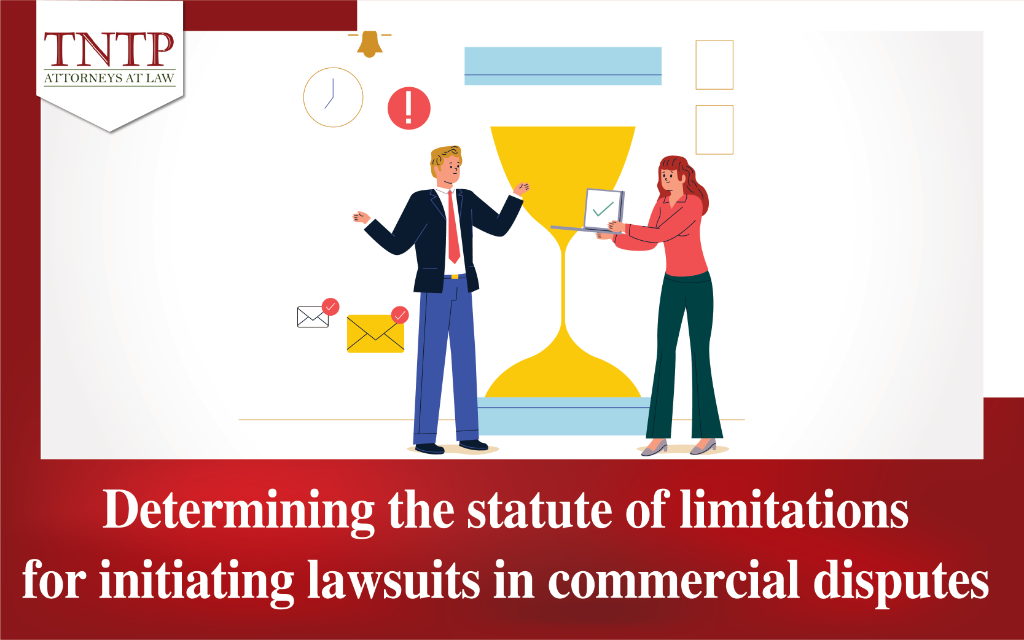Determining the statute of limitations for initiating lawsuits in commercial disputes

Commercial disputes are conflicts over rights and obligations between parties while conducting commercial activities. According to Clause 3 of Article 317 of the Commercial Law 2005, when a dispute related to commercial transactions arises, the involved parties have the right to request the Court or Arbitration to resolve the dispute. However, to ensure the dispute is resolved by the Court or Arbitration, initiating a lawsuit must be within the statute of limitations prescribed by law. In this article, we will address and analyse the legal issues about the statute of limitations for commercial disputes.
1. General provisions on the statute of limitations
The statute of limitations for commercial disputes is stipulated in many laws, specifically as follows:
● Article 319 of the Commercial Law 2005 stipulates that the statute of limitations applicable to commercial disputes is two years from the time the legal rights and interests are infringed, except for the case specified in Point e, Clause 1 of Article 237 of this Law. According to the provision at Point e, Clause 1 of Article 237 of the Commercial Law 2005, Apart from the cases of liability exemption specified in Article 294 of this Law, traders providing logistic services shall not be liable for the goods loss caused in the following cases: … e) After being complained against, traders providing logistic services are not notified of lawsuits against them being instituted at arbitrations or courts within nine months from the date of delivery of goods.
● Article 336 of the Maritime Code 2015 stipulates that the statute of limitations for lawsuits related to marine insurance contracts is 02 years from the time the dispute arises.
● According to Article 33 of the Commercial Arbitration Law 2010, the statute of limitations for initiating lawsuits at arbitration for commercial disputes is 02 years from the time the legal rights and interests are infringed, except for cases where specialized law stipulates otherwise.
As it is regulated in many laws, the statute of limitations for initiating lawsuits at the Court and Arbitration for each specific commercial dispute is determined following the principle below:
● First, the statute of limitations is applied according to the regulations of the specialized law if the dispute relates to specialized law such as the Maritime Code, etc. and the specialized law stipulates a different statute of limitations from the provisions of the Commercial Law 2005.
● Second, the statute of limitations is applied according to the regulations of the Commercial Law 2005.
2. Periods excluded from the statute of limitations
Based on Article 156 of the Civil Code 2015 and Article 44 of the Commercial Arbitration Law 2010, the period excluded from the statute of limitations for commercial disputes is the period during which one of the following events occurs:
● The event of force majeure or objective hindrance prevents the entity with the right to initiate a lawsuit from doing so within the statute of limitations.
An event of force majeure is an event which occurs in an objective manner which is not able to be foreseen and which is not able to be remedied by all possible necessary and admissible measures being taken.
An objective hindrance is a hindrance which in an objective context results in a person with civil rights or obligations not knowing that his or her lawful rights and interests have been infringed or not being able to exercise his or her rights or fulfil his or her civil obligations.
● When the court decides that the dispute falls beyond the arbitration council’s jurisdiction, or there is no arbitration agreement or the arbitration agreement is invalid or unrealizable, the arbitration council shall decide to terminate the dispute settlement. Unless otherwise agreed by the parties, they may bring the dispute to a court within the statute of limitations specified by law. The period from the date the plaintiff initiates a lawsuit at arbitration to the date the court decides to accept the dispute is not included in the statute of limitations for initiating a lawsuit.
3. Recommencement of the statute of limitations
The statute of limitations is the duration prescribed by law, mandatory, and parties are not allowed to agree to extend or shorten it. However, in reality, the statute of limitations can still recommence if it falls within one of the cases according to the provisions of Article 157 of the Civil Code 2015:
● The obligor has acknowledged part or all of its obligations to the plaintiff;
● The obligor has acknowledged or fulfilled part of its obligations to the plaintiff;
● The parties have become reconciled.
When one of these events occurs, the statute of limitations will start again, and the recommencement date is the day after the date these events occur.
Above is the content of the article “Determining the statute of limitations for initiating lawsuits in commercial disputes”. We hope this article will be useful for readers.
Sincerely,



